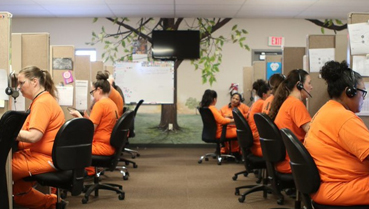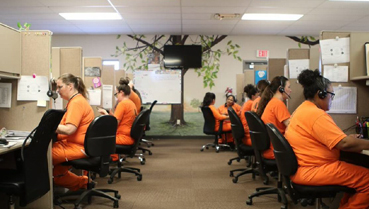How training can transform an incarcerated workforce
‘They outperformed everyone’: How training can transform an incarcerated workforce
Originally published by HR Dive on February 18, 2020 by Aman Kidwai, Associate Editor
The benefits of Televerde’s program may extend to many parties, including its clients, program participants, their children and even the state.
Employers across the country are turning to untapped talent pools — veterans, workers with disabilities and the formerly incarcerated — to survive today’s low unemployment and skill gaps. But one sales and marketing company has gone a step further, setting up shop in prisons and hiring currently incarcerated workers.
“It’s difficult to find people for inside sales roles,” Patricia Yates, head of mid-market territories for SAP North America, told HR Dive in an email. “We get a lot of customer service people, people in sales, but transactional one-off type sales. We find that most of them lack the experience of complex sales and business acumen. As such, there’s a high turnover.”
That’s why SAP and others have hired Televerde, an Arizona-based company that provides demand generation services and has strong ties to the incarcerated and formerly incarcerated populations.
Its program may benefit many: clients, program participants, their children and even the state. “Having a social purpose is a differentiator,” Televerde CEO Morag Lucey told HR Dive. But it’s still a business: “People may like the purpose and support it, but in the end, it’s all about the return on investments that our customers are getting for their spend.”
A way out the ‘revolving door’
“I made a series of terrible life decisions that landed me in prison,” Virginia Mireles, a graduate of the program who is now a global training specialist at Televerde, told HR Dive.
But a change in mindset allowed her to find herself again, she said, thanks in large part to her professional success. She first worked for Televerde in 2003, but never saw herself as someone who could fit in a corporate environment, so she didn’t pursue further employment upon her release. She ended up back in jail, multiple times, she said.
“I knew that if I wanted to get off of this revolving door, that I had to make some changes for myself,” Mireles said. “Potential and possibility were never words that I used to describe myself or, or my future. I never knew there was such a thing as a future. So that’s the first piece that changed.”
Televerde’s training and support aims to prepare participants for the business world, teaching them corporate technology and demand generation. These lessons build on a foundation of participants being treated like people with ability and potential: “When someone values your opinion and sees you as valuable, it changes the way you breathe. It changes the way you look at yourself, and the way you look at the world,” Mireles said.
What’s more, many graduates, like Mireles, go on to work at Televerde itself. “Every time a woman from [the program] transitions to corporate, they are saying ‘I believe in you, I know that you can do this.’ … for many of us, it’s been a long time since someone believed in us.”
The business case: ‘They outperformed everyone’
Televerde operates call centers inside correctional facilities in Arizona and Indiana, with plans to expand into Florida and into other subject areas such as Salesforce administration or Cisco network services.
Its incarcerated workforce goes through extensive training on business principles, sales and marketing strategy, and corporate technology before getting to work. The company hires 25% of program graduates upon their release; 40% of the employees at the corporate office in Phoenix are formerly incarcerated.
It may be a company with a mission, but Televerde’s results have attracted a client list that includes companies like Adobe and SAP. Some program graduates who don’t end up at Televerde are hired by these client companies. “What’s amazing about this workforce is that they are so eager to learn and work harder than most workforces, and are fiercely loyal,” Lucey said. Call center employees have an average tenure of four years.
SAP ran its first pilot with Televerde about 10 years ago and shortly after hired four graduates.
“They outperformed everyone,” Yates said. “They were highly motivated, hard workers, reliable, humble, and grateful. It was clear validation for why we would hire them. What we find today is that several of the agents work really hard for a chance to earn a position directly with SAP.”
Lucey herself is a former client of Televerde, dating back to her time as chief marketing officer at Avaya. And since taking Televerde’s helm, she’s learned how important the company’s strong partnership with the Arizona Office of Corrections is for the success of this business model.
“Normally in companies you don’t have anything between you and your workforce except for HR,” she said. “Here we have a third-party entity in there.”
The offices located within correctional facilities are distributed around the yards of the compound. In the Perryville, Arizona, location, for example, there are five offices in which incarcerated employees work. “You’d be surprised, if you walk in, it looks like any other office except that, of course, all the women are wearing orange,” Lucey said.
Televerde has three civilians at each of those five offices responsible for coaching, training and support. The Department of Corrections trains those managers to work inside the prison.


